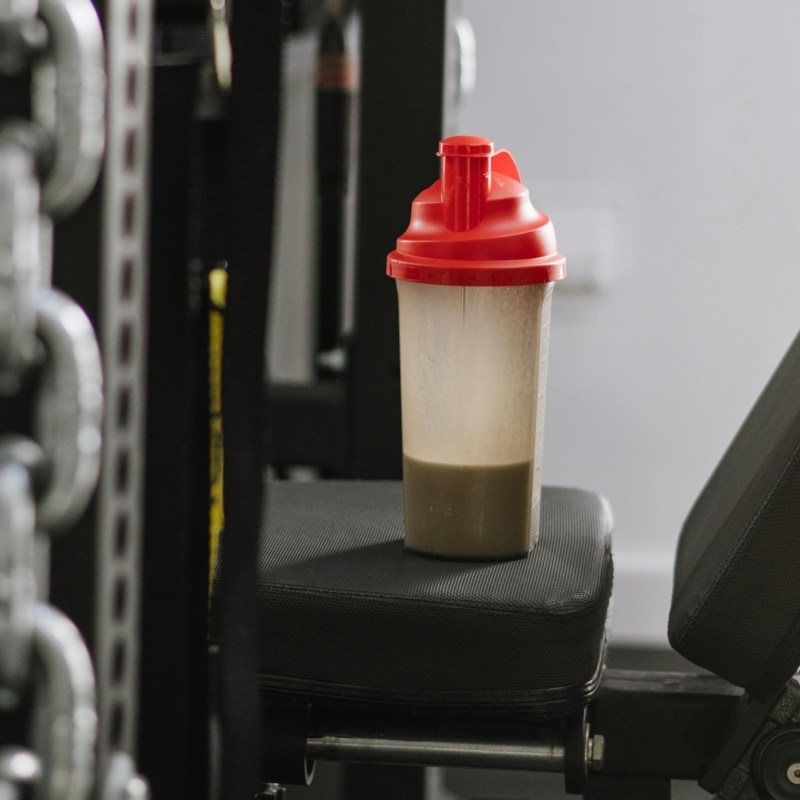If you’re looking into a high-protein diet, you might have some questions, with one of them being, “Does protein make you gain weight?” The answer isn’t quite a straightforward yes or no.
Protein is a source of food, and all food contains calories. Eating too many calories can lead to weight gain. If you ate nothing but protein, but you ate 3,000 calories of it, you would almost certainly gain weight. However, protein is less likely to lead to weight gain than the other macronutrients (carbohydrates and fat).
Let’s get into the details and find out how protein can make you gain weight — or help you lose it.
How many calories are in a gram of protein?

One gram of protein contains four calories. Carbohydrates, similarly, contain four calories per gram, while fat contains nine. However, most sources of food don’t sit purely in one category. Many proteins, especially meats like steak, also contain fat, which can change how many calories you can expect in a serving.
A better way to check your calories is to look at USDA’s FoodData Central. For example, they’ve found that 100 grams of cooked steak contains 27.3 grams of protein and 220 calories. If you multiply the protein content (27.3) by 4 calories per gram, you would only get 109 calories, so trying to guess calorie counts based only on protein content can be misleading.
Does protein make you gain weight more than carbs or fat?

Protein can cause you to gain weight, but carbohydrates and fat are more easily stored in the body and less easily used up afterward. The other macronutrients will usually cause more weight gain than protein will.
How to eat protein to gain weight

Eating meals high in protein can be a great way to gain muscle mass. An example is bulking, which involves eating a calorie surplus to ensure your muscles have the nutrients they need to grow. Even while working out heavily, you will gain weight while bulking, but a lot of the weight will be muscle mass.
How to eat protein to lose weight

Eating lots of protein can be highly effective for weight loss as well. A high-protein diet provides you with enough nutrition without contributing much to fat storage. Plus, protein makes you feel more full, so you can be satiated with fewer calories. It also has a high thermic effect, which means that it requires energy just to digest protein. It’s like kickstarting your metabolism — by the time the protein is digested, your body is already burning energy.
What are the best protein sources to include in your diet?

Some of the best protein sources include meat, eggs, fish, cottage cheese, and Greek yogurt. If you’re worried about weight gain, lean meats like chicken and fish are generally better than fatty steak and bacon, although you can find lean cuts of steak and lower-fat bacon. There are also plenty of vegetable sources with high protein and low fat, such as beans, peas, soy, and seitan (a plant-based protein made from wheat).
3 major benefits of eating enough protein
Building muscle
Muscles are, essentially, made of protein, so eating protein provides the materials they need to grow. If you aren’t eating enough protein, no matter how much you work out, you won’t see very impressive gains. In fact, working out without sufficient protein can even damage your muscles because they can’t rebuild themselves from the stresses of the workout. If you’re looking to get muscle gains, getting enough protein is critical.
Weight loss
Protein can help you feel more full and boost your metabolism. Plus, high-protein foods have a lower glycemic index. That means that they don’t raise your blood sugar much, so your insulin doesn’t have to work hard to balance it. A blood sugar spike also usually leads to a steep dropoff that makes you crave more food, so eating foods with a low glycemic index leads to fewer cravings.
Improved body function
Protein is mostly composed of amino acids, which are the fundamental compounds our body needs to create… basically everything! Amino acids build up everything from our muscles and the tiny machinery in our cells and even the keratin that we need for our hair, skin, and nails. When you get enough protein and enough amino acids, every part of your body has the materials it needs.
What other factors can lead to weight gain?

Many factors can lead to gaining weight. A sedentary lifestyle often leads to weight gain since you’re not burning many calories. Eating highly processed, sugary, and fatty foods also often results in weight gain. Many surprising foods can be sources of unexpected calories that make weight loss difficult. If you’re struggling with weight gain, there are a large number of sources that are more likely contributors than your protein intake.
Frequently asked questions

Should you drink protein shakes daily?
You can, but protein shakes can be processed and sweetened, so it’s usually better to drink protein shakes only on the days that you work out — if you drink them at all! Whole-food sources of protein are often healthier.
Can protein increase belly fat?
It’s possible for protein to increase belly fat indirectly, especially if you’re taking in a calorie surplus. However, to avoid belly fat, it’s better to reduce your overall calorie intake than your protein intake.
Does protein turn into fat if you don’t work out?
Protein doesn’t magically transform into fat. However, if you’re taking in a surplus of calories from protein, that can lead to your fat intake being stored since it isn’t needed for energy.





